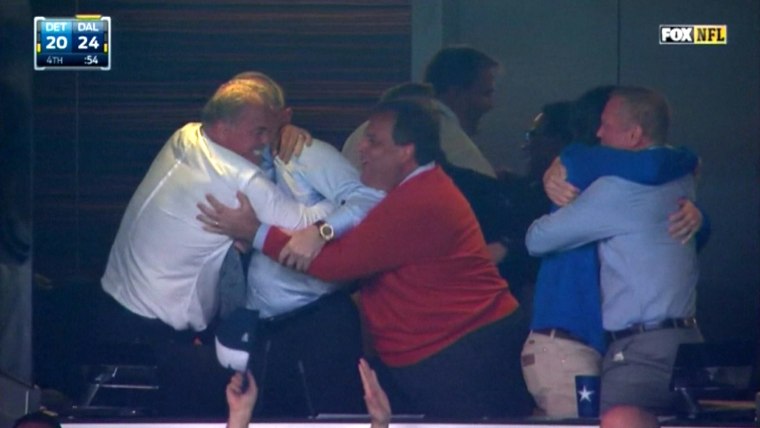New Jersey Gov. Chris Christie (R) makes no secret of the fact that when it comes to football, he doesn't root for the teams that actually play in his home state -- he loves the Dallas Cowboys. In fact, Christie loves his team so much he traveled to Dallas over the weekend to see their playoff game in person, from the comfy confines of the Cowboys' owner's luxury box.
When Dallas scored a late go-ahead touchdown, cameras caught the governor celebrating, awkwardly trying to embrace team owner Jerry Jones. One New Jersey reporter
called it the hug "seen 'round the world."
One of the questions that initially dogged Christie, aside from his taste in teams, had to do with costs -- did the governor ask taxpayers to finance his football excursion? Apparently, the answer is no. Late yesterday, the matter was put to rest when the governor's office issued a statement saying Christie "attended the game last night as a guest of Jerry Jones, who provided both the ticket and transportation at no expense to New Jersey taxpayers."
So, that settles that? Well, sort of. The question of whether Christie forced his constituents to pick the tab has been answered, but the
Wall Street Journal reported this morning on a separate matter.
New Jersey Gov. Chris Christie accepted a plane ride to Dallas and a seat at a Cowboys playoff football game in a luxury suite from team owner Jerry Jones, who has a business relationship with the Port Authority of New York and New Jersey, officials said. [...] The Cowboys, along with the New York Yankees and Checketts Partners Investment Fund, are owners of Legends Hospitality, the operator of a soon-to-be-opened observatory of the 104-story One World Trade Center -- operated by the Port Authority, which Mr. Christie jointly controls with New York Gov. Andrew Cuomo. Financial terms of the deal haven't been publicly disclosed.
The Port Authority, you'll recall, played a central role in Christie's bridge scandal -- it was the governor's top aides at the Port Authority who helped impose crippling traffic on a New Jersey community for political reasons Christie and his team have not yet fully explained.
The WSJ talked to a board member of Legends who said it's "silly" to connect Jones' business interests to Jones' generosity towards Christie. That may very well be true -- this is probably a coincidence.
But the
same article quoted Princeton's Jameson Doig, who wrote a book about the Port Authority, and who said Christie's relationship with, and gifts from, Jones "sends the wrong signal if Christie or any of his top aides appear to have a conflict of interest in their relationship to the Port Authority."
For context, it's worth noting that state lawmakers in New Jersey and New York overwhelmingly approved a major reform package for the Port Authority, drawing the support from both parties in both states. Christie and New York Gov. Andrew Cuomo (D)
vetoed the reforms last week, to
the disappointment of the
New York Times' editorial board.
Rather than approve fundamental reforms passed by near-unanimous votes in both state legislatures, the two governors are proposing a weaker set of changes that would leave largely undisturbed their iron grip over the authority. For good measure, they have demanded the resignations of all present commissioners, which would give them even greater control going forward. [...] The legislative reform would have made it harder for the governors to pack the authority with their friends and political cronies. It would have required the commissioners to swear that their duty was, first and foremost, to the Port Authority's mission of running the bridges, ports, airports and other major facilities in the two states. It would have mandated more public involvement in the agency's decisions, including more public warnings and hearings before any toll increase. The weaker reforms touted by the governors are based on recommendations by a panel appointed by Mr. Christie and Mr. Cuomo.
